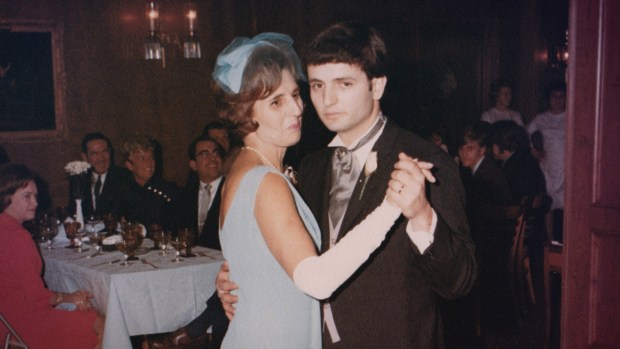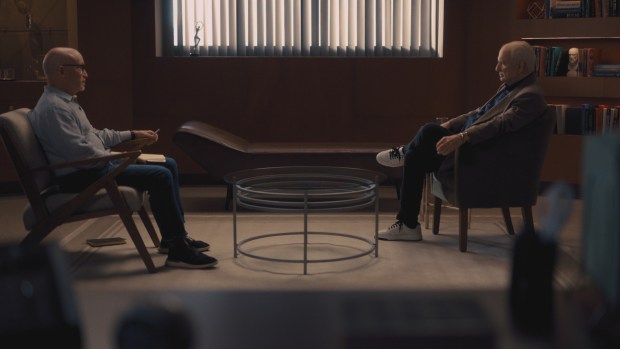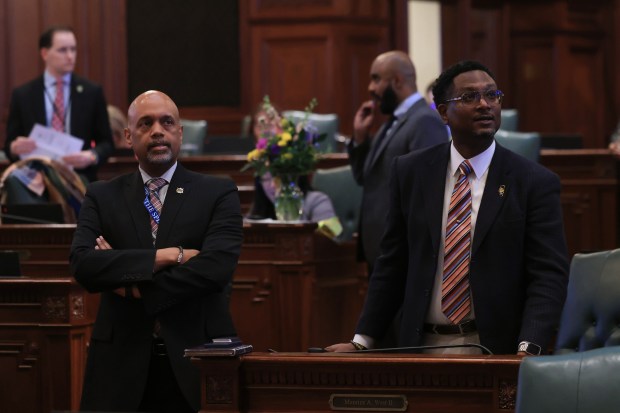“For years, everybody told me that I had to write something about my mother,” David Chase says, but chances are they never imagined he would find a way to do that in a television show about … the New Jersey mob? In the HBO documentary “Wise Guy: David Chase and The Sopranos” (streaming on Max), director Alex Gibney puts all of it under the microscope.
The series premiered 25 years ago, which is as good an excuse as any to look back at a pop cultural phenomenon that not only reshaped Hollywood gangster stories, but our ideas about what TV could even be.
“The Sopranos” was among the earliest examples of “prestige” and Gibney’s documentary is aiming for something prestige-adjacent. It’s on the self-serious side, but maybe jokily so? Their interview takes place on a set that’s a replica of Dr. Melfi’s office, where the psychiatrist and Tony Soprano held their therapy sessions. There’s something funny in the idea of putting Chase in the very same hot seat he created, but it’s a surprisingly flat visual motif meant to underscore the idea that he’s here to spill his guts. He claims to be a reluctant participant, then talks his head off. Make of that what you will, but the parallels to Tony’s mixed feelings about his own psychoanalysis aren’t as interesting as Gibney might have hoped. Even so, if you liked the show, this is an enjoyable revisit through the eyes of key talent.
It’s the kind of behind-the-scenes material that used to be featured as a DVD extra, and it’s satisfying on those terms. But in today’s landscape, it can only exist as a stand-alone project, which creates more portent around it than it probably warrants. The first 10 minutes are saddled with nervous, chaotic, overlapping editing that speeds through Chase’s biography to better focus on the show itself. Once the documentary takes a breath and starts telling a story, it suddenly becomes watchable. But “Wise Guy” ends by mimicking the show’s divisively abrupt final note, which leaves the impression that there’s a deficit of original ideas animating this endeavor.
Split into two episodes, it includes interviews from writers, cast members and HBO executives who talk about the show’s origins, evolution and struggles. There are grainy clips from audition tapes, plus old photos of Chase when he was young, and you realize he has always had what one colleague describes as resting dour face. Is that innate or shaped by a taxing relationship with his mother, Norma?
He spent much of his childhood in the same New Jersey town where the show was filmed, and when he got married in 1968, “a couple of my uncles took me aside and said, ‘You’ve got to get out of here. You’re not going to stay married if you stay here.’ Because they knew what my parents were like and they were really talking about my mother. My wife would not have been able to take it. My mom was just nuts. So we left the night of our wedding and started for California.”

The show’s success meant he and his wife would ultimately be able to buy a house in France. It’s a brief aside but it stands out, because many Hollywood writers and showrunners today are struggling to achieve the same financial windfalls. One hit show isn’t enough to hit the jackpot anymore.
But it was for Chase. Other name-brand producers with similar levels of success have used that to build a TV empire for themselves. Not Chase, which makes him unique. He misses the problem-solving involved in running a TV series, but I would have also liked to hear his thoughts about the kinds of shows that followed in the wake of “The Sopranos,” or what he makes of the depleted state of network TV. He says he found the latter too confining (his credits include “The Rockford Files” and “Northern Exposure”) but everyone in Hollywood is stressed at the moment and the old school broadcast shows remain the most stable and remunerative for people both in front of and behind the camera. Chase isn’t fighting those battles anymore, which presumably frees him up to have some public opinions about the state of television today. Too bad we don’t hear about any of that.
He’s so obviously proud that “The Sopranos” was a representation of his Italian American heritage. Gibney doesn’t ask about Italian Americans who pushed back on that portrayal. Does Chase have myopic view of things? Maybe. Storytellers are allowed that. But isn’t it more interesting in hindsight to explore some of those anxieties through conversion? That was one of the show’s strengths — tackling discordant ideas about who we are and how we want to live. What’s the point of building a set to look like “The Sopranos” if you’re not trying to broach some of the show’s more ambitious conversations about life?
Every character who had a relationship with Tony was making a deal with the devil. Are there parallels to Chase in there? Gibney only glancingly acknowledges the tension that existed in the writers room (which one writer calls toxic). “Let’s put it this way,” Chase says obliquely, “I used to get very angry because no one was coming up with anything. And then since those days I’ve thought, yeah, maybe that’s because you said no to everything, so they stopped.”
Tony made a deal with the devil too, he adds. “He’s really the devil’s representative. But he wasn’t happy with his deal, was he? That’s what I often felt. People said, ‘Oh, he should have been punished!’ and my response was, ‘He was punished every day, this guy — you didn’t see him being miserable for all these years?”
“Wise Guy: David Chase and The Sopranos” — 2.5 stars (out of 4)
Where to watch: Max
Nina Metz is a Tribune critic.




